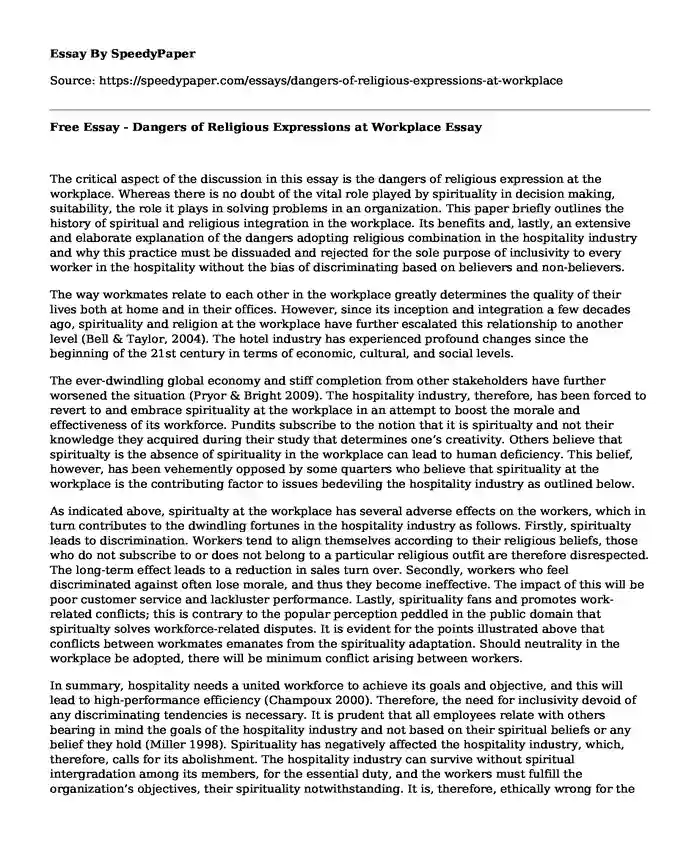
| Type of paper: | Essay |
| Categories: | Religion Job Conflict resolution Social issue |
| Pages: | 3 |
| Wordcount: | 695 words |
The critical aspect of the discussion in this essay is the dangers of religious expression at the workplace. Whereas there is no doubt of the vital role played by spirituality in decision making, suitability, the role it plays in solving problems in an organization. This paper briefly outlines the history of spiritual and religious integration in the workplace. Its benefits and, lastly, an extensive and elaborate explanation of the dangers adopting religious combination in the hospitality industry and why this practice must be dissuaded and rejected for the sole purpose of inclusivity to every worker in the hospitality without the bias of discriminating based on believers and non-believers.
The way workmates relate to each other in the workplace greatly determines the quality of their lives both at home and in their offices. However, since its inception and integration a few decades ago, spirituality and religion at the workplace have further escalated this relationship to another level (Bell & Taylor, 2004). The hotel industry has experienced profound changes since the beginning of the 21st century in terms of economic, cultural, and social levels.
The ever-dwindling global economy and stiff completion from other stakeholders have further worsened the situation (Pryor & Bright 2009). The hospitality industry, therefore, has been forced to revert to and embrace spirituality at the workplace in an attempt to boost the morale and effectiveness of its workforce. Pundits subscribe to the notion that it is spiritualty and not their knowledge they acquired during their study that determines one’s creativity. Others believe that spiritualty is the absence of spirituality in the workplace can lead to human deficiency. This belief, however, has been vehemently opposed by some quarters who believe that spirituality at the workplace is the contributing factor to issues bedeviling the hospitality industry as outlined below.
As indicated above, spiritualty at the workplace has several adverse effects on the workers, which in turn contributes to the dwindling fortunes in the hospitality industry as follows. Firstly, spiritualty leads to discrimination. Workers tend to align themselves according to their religious beliefs, those who do not subscribe to or does not belong to a particular religious outfit are therefore disrespected. The long-term effect leads to a reduction in sales turn over. Secondly, workers who feel discriminated against often lose morale, and thus they become ineffective. The impact of this will be poor customer service and lackluster performance. Lastly, spirituality fans and promotes work-related conflicts; this is contrary to the popular perception peddled in the public domain that spiritualty solves workforce-related disputes. It is evident for the points illustrated above that conflicts between workmates emanates from the spirituality adaptation. Should neutrality in the workplace be adopted, there will be minimum conflict arising between workers.
In summary, hospitality needs a united workforce to achieve its goals and objective, and this will lead to high-performance efficiency (Champoux 2000). Therefore, the need for inclusivity devoid of any discriminating tendencies is necessary. It is prudent that all employees relate with others bearing in mind the goals of the hospitality industry and not based on their spiritual beliefs or any belief they hold (Miller 1998). Spirituality has negatively affected the hospitality industry, which, therefore, calls for its abolishment. The hospitality industry can survive without spiritual intergradation among its members, for the essential duty, and the workers must fulfill the organization’s objectives, their spirituality notwithstanding. It is, therefore, ethically wrong for the hospitality industry to adopt or encourage workers to practice spirituality at their workplaces. The hospitality captains must ensure fair and equitable treatment for its entire workforce, promote unity, and the need to work as a team.
References
Bell, E., & Taylor, S. (2004). From outward bound to inward bound: The prophetic voices and discursive practices of spiritual management development. Human Relations 57, 4, 439 – 466. doi: 10.1177/ 0018726704043895.
Champoux, J.E. (2000). Organizational behavior: Essential tenets for a new millennium. South-Western College Publishing.
Miller, L. (1998). After their check-up for the body, some get one for the soul. The Wall Street Journal, 20 July, A1, A6.
Pryor, R.G. & Bright, J.E.H. (2009). ‘Good hope in chaos: Beyond matching to complexity in career development, South African Journal of Higher Education 23(3), 521-536.
Cite this page
Free Essay - Dangers of Religious Expressions at Workplace. (2023, Aug 31). Retrieved from https://speedypaper.com/essays/dangers-of-religious-expressions-at-workplace
Request Removal
If you are the original author of this essay and no longer wish to have it published on the SpeedyPaper website, please click below to request its removal:
- Free Essay on Prison Overcrowding
- Essay Sample on Social Enterprise Project
- Paper Example. Discrimination Regarding Gender Identity and Sexual Orientation
- Paper Example: Family News
- Free Essay: Education During Covid is Safe to Send Kids to School?
- Most Significant Impact - Free Essay Sample
- Essay Sample on Ethics of Technology in Social Work Practice
Popular categories




